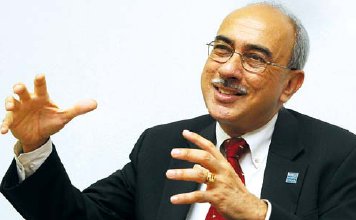HERALD INTERVIEW
With a touch of multinational variety, the KAIST Business School aims to become the top business school in Asia within a few years, said Ravi Kumar, dean of the school.
Kumar, from India, was invited by KAIST president Seo Nam-pyo to lead the business school last year when he was spending his sabbatical leave in Korea while working in the University of Southern California, School of Business. He thus became the first foreigner to become dean of a Korean business school.
“I took interest in Korea as the people’s culture and behavior was very unique and the society was changing at an unprecedented speed,” he told The Korea Herald.
“All the social and economic changes were so visible here.”
With a touch of multinational variety, the KAIST Business School aims to become the top business school in Asia within a few years, said Ravi Kumar, dean of the school.
Kumar, from India, was invited by KAIST president Seo Nam-pyo to lead the business school last year when he was spending his sabbatical leave in Korea while working in the University of Southern California, School of Business. He thus became the first foreigner to become dean of a Korean business school.
“I took interest in Korea as the people’s culture and behavior was very unique and the society was changing at an unprecedented speed,” he told The Korea Herald.
“All the social and economic changes were so visible here.”

When Kumar came back to Korea in 2005, after two previous research trips in the 1990s, the country’s tremendous improvement in business caught his attention.
“Though I was not exactly looking for a career opportunity here, I saw a chance to bring significant changes to the interesting Korea,” he said.
Among the changes brought to the school since he joined was the European Quality Improvement System certification this May. This made KAIST the Korean business school with the highest number of international certifications.
“Mere international recognition, however, is not sufficient,” Kumar said.
“The question is whether we have enough of a competitive edge to draw foreign students to come and earn their academic degrees here.”
The dean’s goal is thus to double the number of foreign students and professors during his term in office, he said.
“I am especially focusing on China and India,” he said.
“Not only because the two countries are on the rise, but more because Korean companies are doing tremendously well there.”
As a competitive globalizing business school, it is important for KAIST to provide capable local managers to such Korean companies, he said.
“The strength of Korean students is that they work hard and have a genuine yearning for education,” Kumar said.
“Their weakness is, however, that the Korean society still lacks the necessary confidence to respond to a global and multilingual environment.”
The KAIST Business School already has an established brand image, especially in its reputed finance courses and the unique technological MBA courses, he said.
“What I aim to do as dean is to make the best of the heritage that KAIST has built up over the past years and take the school into the world or bring the world to us.”
By Bae Hyun-jung (tellme@heraldcorp.com)








![[Graphic News] More Koreans say they plan long-distance trips this year](http://res.heraldm.com/phpwas/restmb_idxmake.php?idx=644&simg=/content/image/2024/04/17/20240417050828_0.gif&u=)
![[KH Explains] Hyundai's full hybrid edge to pay off amid slow transition to pure EVs](http://res.heraldm.com/phpwas/restmb_idxmake.php?idx=644&simg=/content/image/2024/04/18/20240418050645_0.jpg&u=20240419100350)





![[From the Scene] Monks, Buddhists hail return of remains of Buddhas](http://res.heraldm.com/phpwas/restmb_idxmake.php?idx=652&simg=/content/image/2024/04/19/20240419050617_0.jpg&u=20240419175937)

![[KH Explains] Hyundai's full hybrid edge to pay off amid slow transition to pure EVs](http://res.heraldm.com/phpwas/restmb_idxmake.php?idx=652&simg=/content/image/2024/04/18/20240418050645_0.jpg&u=20240419100350)

![[Today’s K-pop] Illit drops debut single remix](http://res.heraldm.com/phpwas/restmb_idxmake.php?idx=642&simg=/content/image/2024/04/19/20240419050612_0.jpg&u=)